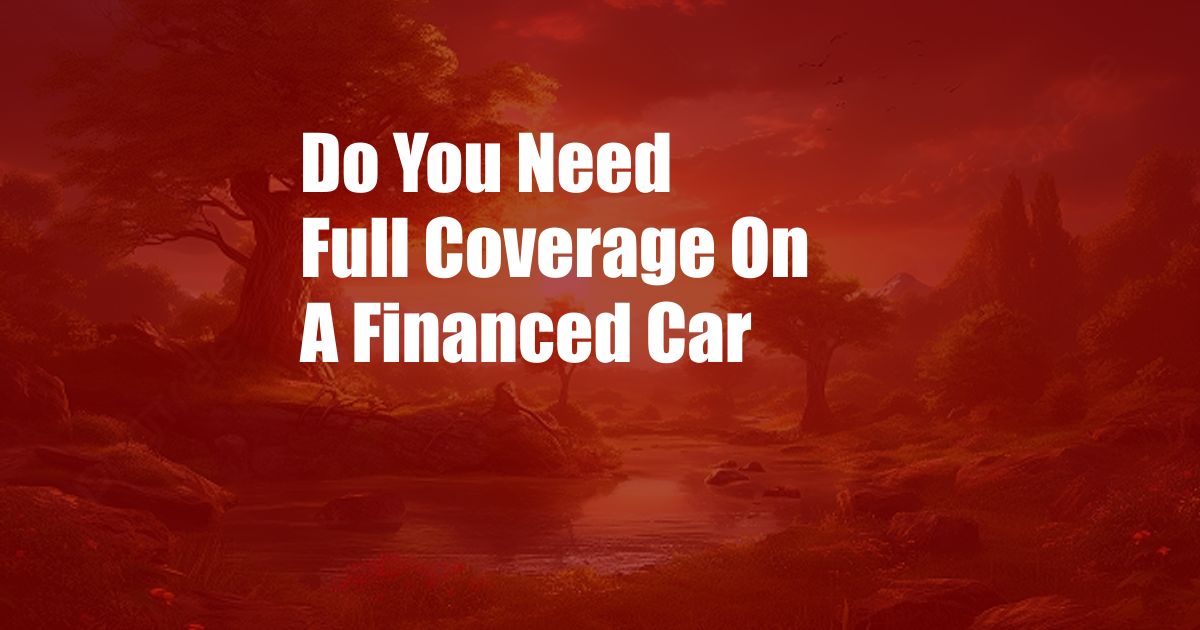
Do You Need Full Coverage on a Financed Car?
When you finance a car, the lender requires you to carry full coverage insurance. This means that your insurance policy must cover the cost of repairing or replacing your car if it is damaged or stolen. Full coverage also includes liability insurance, which covers you if you cause an accident that injures someone or damages their property.
The cost of full coverage insurance varies depending on a number of factors, including your age, driving record, and the make and model of your car. However, it is generally more expensive than liability-only insurance.
Is Full Coverage Always Necessary?
There are some cases in which you may not need full coverage insurance. For example, if you have an older car that is not worth very much, you may not want to pay for the extra cost of full coverage. Or, if you have a good driving record and you are not likely to get into an accident, you may be able to get away with liability-only insurance.
However, there are also some cases in which full coverage insurance is a good idea. For example, if you have a new car or a car that is worth a lot of money, you may want to protect your investment with full coverage. Or, if you have a poor driving record or you are at high risk of getting into an accident, you may want to consider full coverage to protect yourself financially.
What Does Full Coverage Include?
Full coverage insurance typically includes the following types of coverage:
- Collision coverage: This covers damage to your car if you are in an accident with another vehicle or object.
- Comprehensive coverage: This covers damage to your car from events such as theft, vandalism, fire, and hail.
- Liability coverage: This covers you if you cause an accident that injures someone or damages their property.
Full coverage insurance can also include other types of coverage, such as uninsured motorist coverage and personal injury protection. Uninsured motorist coverage protects you if you are hit by a driver who does not have insurance. Personal injury protection covers you for medical expenses and lost wages if you are injured in an accident, regardless of who caused the accident.
Tips for Getting the Best Deal on Full Coverage Insurance
If you are looking for the best deal on full coverage insurance, there are a few things you can do:
- Shop around: Get quotes from several different insurance companies before you buy a policy. This will help you find the best rate.
- Raise your deductible: The deductible is the amount of money you have to pay out of pocket before your insurance coverage kicks in. Raising your deductible will lower your monthly premium.
- Take advantage of discounts: Many insurance companies offer discounts for things like being a good driver, having a safe car, and taking a defensive driving course.
Expert Advice
When it comes to full coverage insurance, it’s always best to talk to an insurance agent to get personalized advice. An agent can help you assess your risks and determine the right amount of coverage for you. They can also help you find the best deal on your insurance.
Here are some expert tips to keep in mind when shopping for full coverage insurance:
- Don’t be afraid to ask questions. Make sure you understand what you’re buying before you sign up for a policy.
- Don’t just go for the cheapest policy. The cheapest policy may not provide you with the coverage you need.
- Consider your deductible. A higher deductible will lower your monthly premium, but it also means you’ll have to pay more out of pocket if you have an accident.
- Take advantage of discounts. Many insurance companies offer discounts for things like being a good driver, having a safe car, and taking a defensive driving course.
FAQs
Q: What is full coverage insurance?
A: Full coverage insurance is a type of car insurance that covers the cost of repairing or replacing your car if it is damaged or stolen. It also includes liability insurance, which covers you if you cause an accident that injures someone or damages their property.
Q: Is full coverage insurance always necessary?
A: Full coverage insurance is not always necessary, but it is a good idea if you have a new car or a car that is worth a lot of money. It is also a good idea if you have a poor driving record or you are at high risk of getting into an accident.
Q: What does full coverage insurance include?
A: Full coverage insurance typically includes collision coverage, comprehensive coverage, and liability coverage. It can also include other types of coverage, such as uninsured motorist coverage and personal injury protection.
Q: How can I get the best deal on full coverage insurance?
A: You can get the best deal on full coverage insurance by shopping around, raising your deductible, and taking advantage of discounts.
Conclusion
Full coverage insurance can provide you with peace of mind in the event that your car is damaged or stolen. However, it is important to weigh the cost of full coverage against the benefits before you decide whether or not to purchase it.
If you are not sure whether or not you need full coverage insurance, it is a good idea to talk to an insurance agent. An agent can help you assess your risks and determine the right amount of coverage for you.
Are you interested in learning more about full coverage insurance?